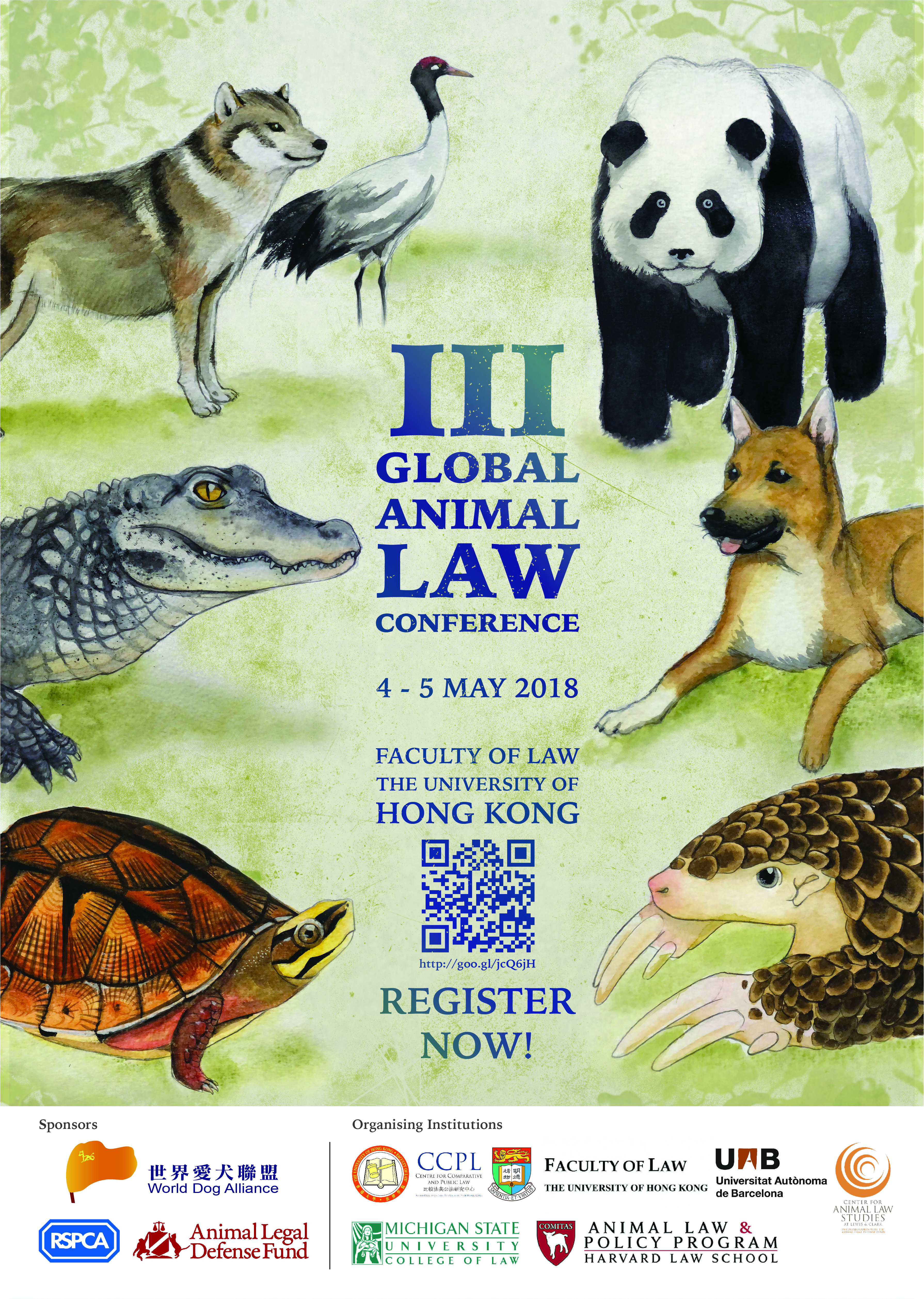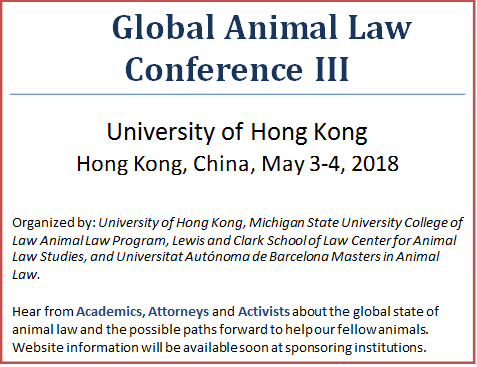Results
| Title | Citation | Alternate Citation | Summary | Type |
|---|---|---|---|---|
| IL - Research - Act 93. Research Dogs and Cats Adoption Act | 510 I.L.C.S. 93/1 - 10 | IL ST CH 510 § 93/1 - 10 | This act, effective January 1, 2018, is entitled the Research Dogs and Cats Adoption Act. Under the act, a research facility shall assess the health of a dog or cat used in research and then make reasonable efforts to offer for adoption a dog or cat determined to be suitable for adoption, either through private placement or through an animal adoption organization. The research facility must have a facility adoption policy that is made available on its website. | Statute |
| Global Animal Law Conference III |
  |
Basic page | ||
| NJ - Pet Sales - Pet Purchase Protection Act | N. J. S. A. 56:8-92 to 56:8-97 | NJ ST 56:8-92 to 56:8-97 | This New Jersey Act protects pet purchasers who receive "defective" companion animals. A purchaser of a defective pet must have his or her pet examined by a veterinarian within 14 days of purchase to receive a refund or exchange. Alternatively, a buyer may retain the pet and be reimbursed for veterinary bills up to two times the cost of the dog or cat. | Statute |
| JONES v. ST. LOUIS, I. M. & S. RY. CO. | 13 S.W. 416 (Ark.1890) | 53 Ark. 27 (1890); 22 Am.St.Rep. 175 |
This involved an action by R. D. Jones against the St. Louis, Iron Mountain & Southern Railway Company, claiming $2,000 damages,--$1,000 for the value of a colt killed by defendant's train, and $1,000 damages for not posting notice of the killing as required by the statute. The court looked at areas in the market outside of the locality since local information on the colt’s market value was not available. The court affirmed the lower court's judgment due to a lack in plaintiff's proofs at trial. |
Case |
| MD - Equine Transport - Subtitle 9. Transporting Horses. | MD Code, Agriculture §§ 3-901 - 903 | MD AGRIC §§ 3-901 - 903 | This Maryland section provides the requirements for transporting horses. The law states that "[a] person may not transport a horse in a vehicle that is not designed and constructed in a manner that at all times protects the health and well-being of the horse being transported." Of importance is the provision that limits the vehicle used to transport the horses to one level (e.g., no double-deck trailers are allowed). Violation of the law incurs a civil penalty in the amount of $500 per horse for the first offense and $1,000 for each subsequent offense. | Statute |
| Heiligmann v. Rose | 16 S.W. 931 (Tex.,1891) | 81 Tex. 222, 16 S.W. 931 (1891) |
Appellees sued appellant for damages after he poisoned three of their dogs. The Court held that an owner has an action and remedy against a trespasser for damages resulting from injuries inflicted upon dogs because they are property. The Court elaborated on the true rule in determining the value of dogs, explaining that It may be either a market value or some special or pecuniary value to the owner. The Court allowed actual damages. |
Case |
| Maldonado v. Fontanes | 568 F.3d 263 (C.A.1 (Puerto Rico),2009) | 2009 WL 1547737 (C.A.1 (Puerto Rico)) |
At issue in this particular opinion is the interlocutory appeal of the Mayor of Barceloneta, Puerto Rico based on the district court's denial of his motion to dismiss on the basis of qualified immunity. This case was initially brought after two successive raids on public housing complexes, within ten days of the Municipality of Barceloneta assuming control of the public housing complexes from the Puerto Rico Public Housing Administration on October 1, 2007. Prior to the raid, the residents, mostly Spanish-speakers, were given notice of the new "no pet policy," which were written in English. During the raids, plaintiffs' pets were seized and then killed by either being slammed against the side of a van or thrown off a 50-foot bridge. This First Circuit affirmed the denial of the Mayor's motion for qualified immunity on the Fourth Amendment and Fourteenth Amendment procedural due process claims. However, it reversed the denial of qualified immunity to the Mayor as to the plaintiffs' Fourteenth Amendment substantive due process claims and ordered those claims dismissed. |
Case |
| Vanderbrook v. Emerald Springs Ranch | 109 A.D.3d 1113 (N.Y.A.D. 4 Dept.,2013). | 971 N.Y.S.2d 754, 2013 N.Y. Slip Op. 06124 |
While on a guided trail ride, plaintiff's horse brushed up against a tree that the plaintiff was unable to push away from. As a result, plaintiff's leg and hip sustained injuries and the plaintiff sued the ranch and the ranch's owners. Defendants’ appealed the Wayne County Supreme Court denial for the defendants' motion for summary. On appeal, the court found the Supreme Court properly denied the defendants' motion for summary judgment. First, the court found the defendants failed to meet their initial burden of establishing entitlement to judgment as a matter of law on the issues of the horse's vicious propensity and defendants' knowledge of that propensity. |
Case |
| Colombia - Slaughter - Decreto 1500, 2007 | Decreto 1500 de 2007 | This decreto establishes the technical rules that frame the system of inspections, supervision and controls over meat processed for human consumption. These health requirements must be met at every step of the chain, from primary production to marketplaces. Article 31, lays out the requirements for the antemortem and postmortem inspection of animals in slaughterhouses. Numeral 3 of this article establishes that slaughter methods must be humane. According to this article, animals must be slaughtered through non-cruel methods. Animals have to be appropriately stunned before being slaughtered. Slaughter must be done following correct techniques, avoiding unnecessary risks for the operator and suffering of the animal. The methods utilized must be authorized by the National Institute for Drug and Food Supervision (INVIMA). This article establishes ritual religions as the only exception to humane slaughter. This process must be supervised and approved by the Invima. | Statute | |
| MS - Exotic pet - Chapter 8. Importation, Sale and Possession of Inherently Dangerous Wild Animals. | Miss. Code Ann. § 49-8-1 to 49-8-19 | MS ST § 49-8-1 to 49-8-19 | This Mississippi chapter states that it is in the public interest to ensure the public health, safety and welfare by strictly regulating the importation, sale, transfer and possession of those wild animals inherently dangerous to humans. Several species are listed under this section as inherently dangerous to humans, including non-human primates, wolves, bears, hyenas, big cats, and hippopotamus, among others. It is unlawful for a person to import, transfer, sell, purchase or possess any wild animal classified inherently dangerous by law or regulation unless that person holds a permit. Those persons who were in possession of such animals on or before May 1, 1997 were able to continue possession provided that they complied with the permit process. Prior to the issuance of a permit, the applicant must have provided proof of liability insurance in the amount of $100,000.00 for each wild animal up to a maximum of $1,000,000.00. | Statute |